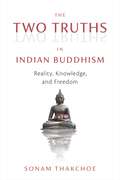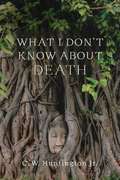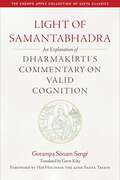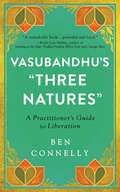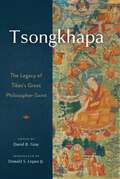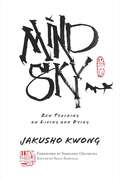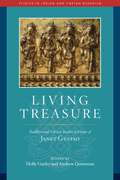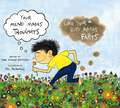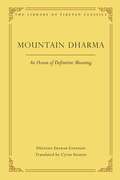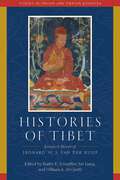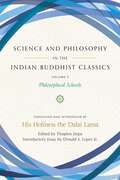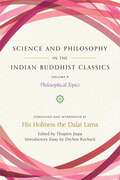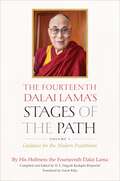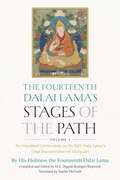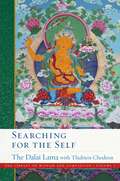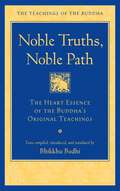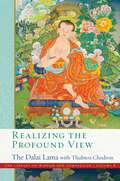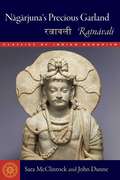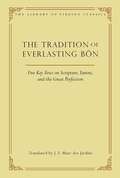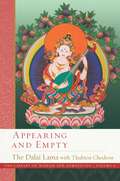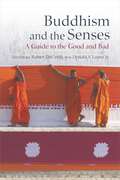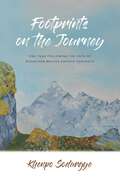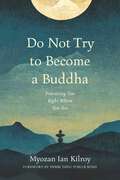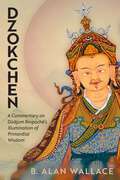- Table View
- List View
The Two Truths in Indian Buddhism: Reality, Knowledge, and Freedom
by Sonam ThakchoeAn insightful and illuminating survey of key insights into one of the most foundational and profound topics in Buddhist thought.In this clear and exemplary approach to one of the core philosophical subjects of the Buddhist tradition, Sonam Thakchoe guides readers through the range of Indian Buddhist philosophical schools and how each approaches the two truths: ultimate truth and conventional truth. In this presentation of philosophical systems, the detailed argumentations and analyses of each school&’s approach to the two truths are presented to weave together the unique contributions each school brings to supporting and strengthening a Buddhist practitioner&’s understanding of reality. The insights of the great scholars of Indian Buddhist history—such as Vasubandhu, Bhavaviveka, Kamalashila, Dharmakirti, Nagarjuna, and Chandrakirti—are illuminated in this volume, with profound implications for the practice and views of modern practitioners and scholars. The Vaibhashika, Sautrantika, Yogachara, and Madhyamaka schools provide a framework for a continuum of philosophical debate that is far more interrelated, and internally complex, than one may presume. Yet we see how the schools build upon the findings of one another, leading from a belief in the realism of external phenomena to the relinquishment of any commitment to realism of either external or internal realities. This fascinating movement through philosophical approaches leads us to see how the conventional and ultimate—dependent arising and emptiness—are twin aspects of a single reality.
What I Don't Know about Death: Reflections on Buddhism and Mortality
by C.W. Huntington Jr.A Buddhist scholar reflects on life, death, and the ways we blind ourselves to the inevitable as he confronts his own mortality.In the winter of 2020 a renowned scholar of Asian religions, lifelong meditator, and novelist accustomed to vigorous health received a terminal diagnosis. By summer his cancer had run its course. In the short time in between, C. W. &“Sandy&” Huntington faced his own impending death, leading him to reconsider the teachings and practices, as well as philosophy and literature, he had spent a lifetime pursuing. In this, his last book, you&’ll join Sandy as he traverses the gap between knowledge and true wisdom. &“Sandy Huntington urges his readers to face up to life&’s fragility as well as its many gifts. Written with elegance and verve, What I Don&’t Know about Death is a deep meditation on what it means both to wake up to and to let go of life. Drawing on his lifelong engagement with Buddhism, Huntington remains a consummate teacher who demands intellectual honesty, humility, and compassion from his readers no less than from himself. This book is an intellectual and spiritual offering to Huntington&’s students, past and future.&”—Leora Batnitzky, Ronald O. Perelman Professor of Jewish Studies and professor of religion, Princeton University &“What I Don&’t Know about Death is a deeply personal, intellectually rigorous, and philosophically profound exploration of death, and in particular of Sandy&’s own death, which he faced with exemplary grace, honesty, and clarity as he wrote this book. This is a gift of remarkable beauty that can open our hearts and minds to this most difficult topic. Read it and weep, with tears of grief, gratitude, and illumination.&”—Jay L. Garfield, Smith College and the Harvard Divinity School
Light of Samantabhadra: An Explanation of Dharmakirti's Commentary on Valid Cognition
by Gorampa Sönam SengéAn illuminating gateway to Indian philosophy and its explication in Tibet.Among the many works produced in the rich philosophical tradition of India&’s classical age, few have had more impact than Dharmakirti&’s Commentary on Valid Cognition (Pramanavarttika). Composed in India in the seventh century, it became the cornerstone for the study of logic and epistemology in the Tibetan Buddhist tradition. An important addition to any collection for the Sakya practitioner, Light of Samantabhadra translates the work of one of the premier scholars of the Sakya school, Gorampa Sonam Sengé (1429–89). Gorampa here illuminates the first two chapters of Dharmakirti&’s treatise, those on using inference to enlighten oneself (svarthanumana) and on establishing valid cognition (pramanasiddhi), both to determine the authority of the Buddha as a valid teacher and to eliminate the cognitive obstacles to awakening. The root text is composed in compact verses, and these are translated here along with Gorampa&’s word-by-word commentary that reveals their often-veiled meanings. These chapters explore key issues in the philosophy of language and the nature of conventional designation, the way to employ sound reasoning, the proof of past and future lives, and the way to eliminate the view of self. In the skilled hands of translator Gavin Kilty, these insights are made accessible to contemporary readers.
Vasubandhu's "Three Natures": A Practitioner's Guide for Liberation
by Ben ConnellyIn this book, Ben Connelly shows the power of integrating early Buddhist psychology with the Mahayana emphasis on collective liberation. You&’ll discover how wisdom from fourth-century India can be harnessed to heal and transform systems of harm within ourselves and our communities. The three natures (svabhavas)—the imaginary, dependent, and complete, realized natures—are inherent aspects of all phenomena. The imaginary nature of things is what we think they are. Their dependent nature is that they appear to arise from countless conditions. The complete, realized nature is that they aren&’t as we imagine them to be: things that can be grasped or pushed away. The three natures form the backbone of Yogacara philosophy, and by showing us how to see beyond our preconceived notions of ourselves and others, beyond the things that we&’re convinced are &“true,&” they open up a path to personal and communal healing. Dive into this empowering approach to freedom from suffering, from harmful personal and social patterns, and to finding peace and joyfulness in the present.
Tsongkhapa: The Legacy of Tibet's Great Philosopher-Saint
by David B. GrayTsongkhapa&’s seminal contributions to Buddhist thought and practice, and to the course of history, are illuminated and celebrated by some of his foremost modern interpreters.Few figures have impacted the trajectory of Buddhism as much as the great philosopher and meditator, scholar and reformer, Tsongkhapa Losang Drakpa (1357–1419), the founder of the Geluk school of Tibetan Buddhism and teacher of the First Dalai Lama. His Ganden tradition spread throughout Central Asia and Mongolia, and today, through figures such as the Dalai Lama, who calls Tsongkhapa a second Nagarjuna, his teachings are shaping intellectual conversations and ethical practice globally. To commemorate the 600th anniversary of Tsongkhapa&’s passing, a special conference was held at Ganden Monastery in India in 2019, featuring some of the best translators and interpreters of his teachings today. Highlights of those incisive summations of Tsongkhapa&’s special contributions are gathered in this volume. Here we discover Tsongkhapa the philosopher, Tsongkhapa the master of the Buddhist canon, Tsongkhapa the tantric adept, and Tsongkhapa as the visionary who united wisdom to compassion. Each of the authors featured looks at a distinct facet of Tsongkhapa&’s legacy. Donald Lopez provides a global context, Guy Newland distills Tsongkhapa&’s Middle Way, Dechen Rochard uncovers the identity view, Jay Garfield examines the conceptualized ultimate, Thupten Jinpa highlights the seminal importance Tsongkhapa placed on ascertainment, David Gray looks at his approach to Cakrasamvara tantra, Gavin Kilty surveys his Guhyasamaja tantra commentary, Roger Jackson surmises his views on Zen and mahamudra, Geshé Ngawang Samten examines his provisional-definitive distinction, Gareth Sparham highlights his scholastic prowess, Mishig-Ish Bataa illuminates his impact in Mongolia, and Bhiksuni Thubten Chodron presents his instructions on how to cultivate compassion. Whether you are well acquainted with Tsongkhapa&’s life and thought or you are encountering him here for the first time, you will find The Legacy of Tsongkhapa an illuminating survey of his unique explorations of the highest aspirations of humanity.
Mind Sky: Zen Teaching on Living and Dying
by Jakusho Kwong-roshiA collection of talks, photos, and calligraphy by Jakusho Kwong-roshi, exploring the profound beauty of Zen history and practice, nature, and the philosophy of the ancient Zen master Eihei Dogen.&“In Zen meditation, anything that comes in your mind will eventually leave, because nothing is permanent. A thought is like a cloud moving across the blue sky. Nothing can disturb that all-encompassing vastness. This is the Dharma". In a collection of talks and anecdotes, Jakusho Kwong-roshi, a Dharma successor of Shunryu Suzuki-roshi, presents his approach to Buddhist teaching. Containing photos of Kwong-roshi with his teachers, as well as a selection of his vibrant calligraphy, Mind Sky explores the profound beauty of Zen history and practice, nature, and the philosophy of the ancient Zen master Eihei Dogen. With an elegant simplicity, Jakusho Kwong-roshi shows how Zen is experiential rather than intellectual. And with persistent practice, realization is already yours.
Living Treasure: Buddhist and Tibetan Studies in Honor of Janet Gyatso (Studies in Indian and Tibetan Buddhism)
by Holly Gayley and Andrew QuintmanSenior scholars and former students celebrate the life and work of Janet Gyatso, professor of Buddhist studies at Harvard Divinity School. Inspired by her contributions to life writing, Tibetan medicine, gender studies, and more, these offerings make a rich feast for readers interested in Tibetan and Buddhist studies.Janet Gyatso has made substantial, influential, and incredibly valuable contributions to the fields of Buddhist and Tibetan studies. Her paradigm-shifting approach is to take a topic, an idea, a text, a term—often one that had long been taken for granted or overlooked—and turn it inside out, to radically reimagine the kinds of questions that might be asked and what the answers might reveal. The twenty-nine essays in this volume, authored by colleagues and former students—many of whom are now also colleagues—represent the breadth of her interests and influence and the care that she has taken in training the current generation of scholars of Tibet and Buddhism. They are organized into five sections: Women, Gender, and Sexuality; Biography and Autobiography; the Nyingma Imaginaire; Literature, Art, and Poetry; and Early Modernity: Human and Nonhuman Worlds. Contributions include José Cabezón on the incorporation of a Buddhist rock carving in Central Asian culture; Matthew Kapstein on the memoirs of an ambivalent reincarnated lama; Willa Baker on Jikmé Lingpa&’s theory of absence; Andrew Quintman on a found poem expressing worldly sadness on the forced closure of a monastery; and Padma &’tsho on Tibetan women&’s advocacy for full female ordination. These and the many other chapters, each fascinating reads in their own right, together offer a glowing tribute to a scholar who indelibly changed the way we think about Buddhism, its history, and its literature.
Your Mind Makes Thoughts Like Your Butt Makes Farts
by Todd Strauss-SchulsonMost mindfulness books for kids are calm and soothing; this one is funny and gross—just what kids like! Sometimes we have nightmares, or we&’re filled with anxiety and fear. And when you&’re a kid, you don&’t always understand why or what to do about it. Your Mind Makes Thoughts Like Your Butt Makes Farts is funny and gross, but more importantly, it gives kids the big tools they need to cultivate a relationship with their mind, to become its friend and understand that they don&’t have to listen to everything it says—to realize that thoughts (like gas) will pass.
Mountain Dharma: An Ocean of Definitive Meaning (Library of Tibetan Classics #7)
by Cyrus Stearns Dolpopa Sherab GyaltsenA brilliant annotated translation of Dölpopa Sherab Gyaltsen&’s Mountain Dharma that opens a masterpiece of the Jonang tradition to Western readers and presents Dölpopa&’s provocative ideas about a true, eternal, and established reality that still impact Buddhism today.The controversial master Dolpopa Sherab Gyaltsen shook Buddhist Tibet when he taught that an eternal enlightened essence, or buddha nature, exists in full form in all living beings. The ideas discussed in Mountain Dharma are still as provocative now as when Dolpopa first taught them, impacting Buddhism to this day. Dolpopa identified the ultimate with the buddha nature, or sugata essence, which he held to be eternal and not empty of self-nature. The buddha nature is perfect, with all its characteristics inherently present in all living beings. It is only the impermanent and temporary afflictions veiling the buddha nature that are empty of self-nature and must be removed through the practice of the path to allow it to manifest. Dolpopa establishes the validity of his theories with an ocean of quotations selected from Indian Buddhist scriptures and treatises of indisputable authority, showing us that the ultimate is a true, eternal, and established reality, empty merely of other relative phenomena.
Histories of Tibet: Essays in Honor of Leonard W. J. van der Kuijp
by Kurtis R. Schaeffer, Jue Liang, and William A. McGrathThe thirty-four essays in this volume follow the particular interests of Leonard van der Kuijp, whose groundbreaking research in Tibetan intellectual and cultural history imbued his students with an abiding sense of curiosity and discovery.As part of Leonard van der Kuijp&’s research in Tibetan history, as he patiently and expertly revealed treasures of the Tibetan intellectual tradition in fourteenth-century Tsang, or seventeenth-century Lhasa, or eighteenth-century Amdo, he developed an international community of colleagues and students. The thirty-four essays in this volume follow the particular interests of the honoree and express the comprehensive research that his international cohort have engaged in alongside his generous tutelage over the course of forty years. He imbued his students with the abiding sense of curiosity and discovery that can be experienced through every one of his writings, and that can be found as well in these new essays in intellectual, cultural, and institutional history by Christopher Beckwith, the late Hubert Decleer, Franz-Karl Ehrhard, Jörg Heimbel and David Jackson, Isabelle Henrion-Dourcy, Nathan Hill, Matthew Kapstein, Kurtis Schaeffer, Michael Witzel, Allison Aitken, Yael Bentor, Pieter Verhagen, Todd Lewis, William McGrath, Peter Schwieger, Gray Tuttle, and others.
Nagarjuna's Advice for Buddhists: Geshe Sopa's Explanation of Letter to a Friend
by Lhundub SopaA modern commentary by a beloved Tibetan teacher on a classical Indian Buddhist text and an introduction to Buddhism by one of the tradition&’s most famous authors. A teaching on how to live a Buddhist life in contemporary society.Letter to A Friend, by the great Indian philosopher Nagarjuna, is one of the best-known introductions to Buddhism in classical Indian Buddhist literature. In this warm and generous commentary, one of the twentieth century&’s most beloved teachers, Geshe Lhundup Sopa, shows how Nagarjuna&’s advice on how to follow Buddhist ethics while living fully in the world speaks just as clearly to us today as it did to the Indian king for whom it was composed. Nagarjuna maintained that all Buddhists can embody the full teachings of the Buddha. Therefore, this book covers topics from simple virtues to the most profound truths of emptiness. Expertly compiled by his student, scholar Beth Newman, from talks given over a number of years, the commentary brings this ancient Buddhist teaching to a modern audience.
Science and Philosophy in the Indian Buddhist Classics, Vol. 3: Philosophical Schools
by His Holiness Dalai LamaDeepen your understanding of meaning and truth with the third volume of the Dalai Lama&’s esteemed series Science and Philosophy in the Indian Buddhist Classics.Science and Philosophy in the Indian Buddhist Classics compiles classical Buddhist explorations of the nature of the material world, the human mind, reason, and liberation, and puts them into context for the modern reader. This ambitious four-volume series—a major resource for the history of ideas and especially the history of science and philosophy—has been conceived by and compiled under the visionary supervision of His Holiness the Dalai Lama himself. It is his view that the exploratory thinking of the great masters of classical India still has much that is of interest to us today, whether we are Buddhist or not. These volumes make those insights accessible. In this third volume the focus turns to exploring the philosophical schools of India. The practice of presenting the views of various schools of philosophy dates back to the first millennium in India, when proponents of competing traditions would arrange the diverse sets of philosophical positions in a hierarchy culminating in their own school&’s superior tenets. Centuries later, relying on the Indian Buddhist treatises, Tibet developed its own tradition of works on tenets (grub mtha&’), often centered on the four schools of Buddhist philosophy, using them to demonstrate the philosophical evolution within their own tradition, and within individual practitioners, as they progressed through increasingly more subtle expressions of the true reality. The present work follows in this venerable tradition, but with a modern twist. Like its predecessors, it presents the views of seven non-Buddhist schools, those of the Samkhya, Vaisesika, Nyaya, Mimamsa, Vedanta, Jaina, and Lokayata, followed by the Buddhist Vaibhasika, Sautrantika, Cittamatra, and Madhyamaka schools, arranging them like steps on a ladder to the profound. But rather than following in the sharply polemical approach of its ancient predecessors, it strives to survey each tradition authentically, relying on and citing the texts sacred to each, allowing the different traditions to speak for themselves. What, it asks, are the basic components of the world we experience? What is the nature of their ultimate reality? And how can we come to experience that for ourselves? See how the rich spiritual traditions of India approached these key questions, where they agreed, and how they evolved through dialogue and debate. This presentation of philosophical schools is introduced by His Holiness and is accompanied by an extensive introduction and survey by Professor Donald Lopez Jr. of the University of Michigan, who is uniquely qualified to communicate the scope and significance of this literary and spiritual heritage to modern readers.
Science and Philosophy in the Indian Buddhist Classics, Vol. 4: Philosophical Topics
by His Holiness the Dalai LamaThis fourth and final Science and Philosophy in the Indian Buddhist Classics volume provides, through extensive passages, a window into the works of the great thinkers from the flowering of philosophy in classical India.This is the second philosophy volume in the Science and Philosophy series. Whereas the first philosophy volume presented the views of the non-Buddhist and Buddhist schools in sequence, the present work selects specific topics for consideration, including the nature of the two truths, the analysis of self, the Yogacara explanation of reality, emptiness in the Madhyamaka tradition, a survey of logic and epistemology, and the Buddhist explanation of language and meaning. Like earlier volumes, it provides, through extensive extracts, a window into the works of the masters of the Nalanda tradition. The final section on language is particularly unique and largely crafted by Thupten Jinpa.
The Fourteenth Dalai Lama's Stages of the Path, Volume One: Guidance for the Modern Practitioner
by His Holiness the Dalai LamaDiscover His Holiness the Dalai Lama&’s advice for finding happiness, helping others, and applying insights from Buddhist thought to everyday life—for a life of greater harmony, meaning, and joy, for ourselves, others, and in our world.This first volume of The Fourteenth Dalai Lama&’s Stages of the Path shares His Holiness&’s teachings on specific topics of vital relevance to contemporary life: - how kindness and compassion are the foundation for individual happiness and world peace; - how we can solve manmade problems; - how Buddhism does not conflict with modern science and can actually contribute to its advancement; - how gender equality is fundamental for a decent and just society; - and much more. His Holiness&’s messages on these topics will be of value to all readers, Buddhists and non-Buddhists alike. These teachings embody the Dalai Lama's generous warmth and humor, his expertise in presenting important Buddhist ideas, and his ability to inspire us toward greater kindness and happiness.
The Fourteenth Dalai Lama's Stages of the Path, Volume 2: An Annotated Commentary on the Fifth Dalai Lama's Oral Transmission of Mañjusri
by His Holiness the Dalai LamaCentral to Buddhism is knowing our own minds. Until we do, we are driven by unconscious, often destructive desire and aversion.The Fourteenth Dalai Lama&’s Stages of the Path: An Annotated Commentary on the Fifth Dalai Lama's Oral Transmission of Mañjusri is the second volume of the Dalai Lama&’s outline of Buddhist theory and practice. Having introduced Buddhist ideas in the context of modern society in volume one, the Dalai Lama turns here to a traditional presentation of the complete path to enlightenment, from developing faith in the Dharma to attaining the highest wisdom. This book, compiled by the revered Tibetan lama Dagyab Rinpoché, comments on the Fifth Dalai Lama&’s stages of the path titled Oral Transmission of Mañjusri. The volume will appeal to all readers interested in the Dalai Lama&’s works, both those new to Buddhism and those looking to deepen their understanding of the Tibetan presentation of the Buddhist path.
Searching for the Self (The Library of Wisdom and Compassion #7)
by His Holiness the Dalai Lama Venerable Thubten ChodronHis Holiness the Dalai Lama explores emptiness, one of the most central teachings in Buddhism, in the newest volume of the bestselling series The Library of Wisdom and Compassion.In Searching for the Self the Dalai Lama leads us to delve deeply into the topic of the ultimate nature of reality, presenting it from a variety of approaches while focusing on identifying our erroneous views and directing us to the actual mode of existence of all persons and phenomena. Placing our study of reality within the auspicious context of a compassionate motivation to benefit all sentient beings, the Dalai Lama explains why realizing emptiness is important and what qualities are needed to do that, and he evaluates various tenet systems&’ perspectives on this vast topic. He then helps us understand our perceptions and the mental states involved in both our ignorant and accurate cognitions. He examines inherent existence and other fantasized ways of existence that we seek to disprove through reasoned analysis and presents the Middle Way view that abandons all extremes. The closing chapters by Thubten Chodron discuss the three characteristics of impermanence, unsatisfactoriness, and not-self as explained in the Pali tradition and show how meditation on these can lead to the meditative breakthrough to realize nirvana. Engaging in this investigation with His Holiness will challenge our deepest-held beliefs and uproot false ways of viewing ourselves and the world that are so habitual we don&’t even notice them. Get ready to be challenged and intrigued, for realizing the nature of reality has the power to cut our defilements at the root and free us from cyclic existence forever!
Noble Truths, Noble Path: The Heart Essence of the Buddha's Original Teachings
by Bhikkhu BodhiBrilliantly translated by Bhikkhu Bodhi, this anthology of suttas from the Samyutta Nikaya takes us straight to the heart of the Buddha&’s teaching on liberation through the four noble truths and the noble eightfold path—the two mainstays of Buddhist doctrine that illuminate the nature of things by generating direct insight into the teachings. These suttas all pertain to the ultimate good, the attainment of nibbana, or liberation. They illuminate the Buddha&’s radical diagnosis of the human condition—and more broadly, the condition of all sentient existence—in light of the four noble truths. They underscore the pervasive flaws inherent in the round of rebirths, trace our existential predicament to its deepest roots, and lay out the path to unraveling our bondage and winning irreversible release. Ven. Bodhi arranged the chapters, each with its own introduction, to provide an overview of the Dhamma that mirrors the four noble truths, thus enabling students of Early Buddhism to see into the heart of the Buddha&’s teachings as directly and clearly as possible.
Realizing the Profound View (The Library of Wisdom and Compassion #8)
by His Holiness the Dalai Lama Venerable Thubten CnodronThe eighth volume in the Dalai Lama&’s definitive and bestselling Library of Wisdom and Compassion series, and the second of three focusing on emptiness.In Realizing the Profound View the Dalai Lama presents the analysis and meditations necessary to realize the ultimate nature of reality. With attention to Nagarjuna&’s five-point analysis, Candrakirti&’s seven-point examination, and Pali sutras, the Dalai Lama leads us to investigate who or what is the person. Are we our body? Our mind? If we are not inherently either of them, how do we exist, and what carries the karma from one life to the next? As we explore these and other fascinating questions, he skillfully guides us along the path, avoiding the chasms of absolutism and nihilism, and introduces us to dependent arising. We find that although all persons and phenomena lack an inherent essence, they do exist dependently. This nominally imputed mere I carries the karmic seeds. We discover that all phenomena exist by being merely designated by term and concept—they appear as like illusions, unfindable under ultimate analysis but functioning on the conventional level. Furthermore, we come to understand that emptiness dawns as the meaning of dependent arising, and dependent arising dawns as the meaning of emptiness. The ability to posit subtle dependent arisings in the face of realizing emptiness and to establish ultimate and conventional truths as non-contradictory brings us to the culmination of the correct view. The second of three volumes on the nature of reality in the Library of Wisdom and Compassion series, Realizing the Profound View challenges the ways we view the self and the world, bringing us that much closer to liberation.
Nagarjuna's Precious Garland: Ratnavali (Classics of Indian Buddhism)
by Sara McClintockDiscover the eloquence and insight of the philosopher Nagarjuna, held by tradition to be a second Buddha, in this concise instruction for a king that is considered a masterpiece of Buddhist literature.In this profound work of five hundred verses, we encounter a presentation of Buddhism that integrates both the worldly and the transcendent. The clear and sagacious advice laid out on every page serves as a road map to one&’s highest goal—whether that goal is a better life, here called the Dharma of ascendance, or the ultimate one of spiritual freedom, the Dharma of the highest good. The verses, written for an unnamed ruler, touch on questions of statecraft, but their broader themes speak to us today because they tackle the difficulty of integrating one&’s spiritual journey with the social and political demands of daily life. Nagarjuna was an Indian Buddhist teacher, probably of the second century CE, who was renowned for his astute articulation of the philosophy of the Middle Way (Madhyamaka). His thoroughgoing critique of all forms of essentialism became a touchstone for Mahayana Buddhism in India, Tibet, and throughout East Asia, and his importance for the development of the Mahayana tradition can scarcely be exaggerated. The translators here first rendered Nagarjuna&’s letter for the Dalai Lama&’s teachings on the work in Los Angeles in 1997. While that commemorative edition was translated from the Tibetan, the present volume prioritizes the surviving Sanskrit verses along with the only known Indian commentary, by the eleventh-century scholar Ajitamitra. This is the first complete translation in English of the Precious Garland that takes the Indian text and commentary as its primary authorities. In addition, the translators provide rigorous working editions of the Sanskrit and Tibetan verses they translate. This elegant and precise rendering of Nagarjuna&’s work is certain to become the touchstone translation of this celebrated Buddhist text.
The Tradition of Everlasting Bön: Five Key Texts on Scripture, Tantra, and the Great Perfection
by J. F. Marc des JardinsAn annotated translation of five key texts of the Everlasting (Yungdrung) Bön school selected by the late H. H. Menri Trizin Rinpoché that includes scriptural teachings, a root tantra based on revealed teachings of the unconditioned absolute, a canonical commentary on the root tantra, an exposition of the Yungdrung tantric system, and the oral instructions on Bön meditation practices associated with experiencing the nature of the mind, the Great Perfection systems.This authoritative annotated translation of five key texts of Everlasting (Yungdrung) Bön by Marc des Jardins opens up a relatively unknown tradition that, since the arrival of Buddhism in Tibet, has undergone great transformations in its philosophy, doctrinal teachings, and meditative practices. Each text represents an important aspect of the tradition. The first text, by Drogön Azha Lodrö Gyaltsen (1198–1263), presents the grounds and paths of the Greater Vehicle of the Bön tradition and represents the philosophical ideology of its teachings based on the scriptures contained in the Bön canon. The second text is a short root tantra attributed to revealed teachings from Kuntu Zangpo, the personification of the unconditioned absolute. The third text is a commentary on this root tantra attributed to Drenpa Namkha (fl. eighth century), a Bönpo sage contemporary with Padmasambhava. The fourth text, by Nyamé Sherap Gyaltsen (1356–1415), presents a general exposition of the tantric system according to Yungdrung Bön. The final text, by Drutön Gyalwa Yungdrung (1242–90), pertains to the oral instructions on the meditation practices of Bön, especially on the cycle of practices associated with experiencing the nature of the mind, the Great Perfection systems. All five texts have been selected by the late H. H. Menri Trizin Rinpoché, Lungtok Tenpai Nyima (1927–2017), the thirty-third abbot of Menri Monastery, the central institution of the Yungdrung Bön school.
Appearing and Empty (The Library of Wisdom and Compassion #9)
by Venerable Thubten Chodron His Holiness the Dalai LamaIn this final volume on emptiness, the Dalai Lama skillfully reveals the Prasangikas&’ view of the ultimate nature of reality so that we will gain the correct view of emptiness, the selflessness of both persons and phenomena, and have the means to eliminate our own and others&’ duhkha.In this last of three volumes on emptiness, the Dalai Lama takes us through the Sautrantika, Yogacara, and Svatantrika views on the ultimate nature of reality and the Prasangikas&’ thorough responses to these, so that we gain the correct view of emptiness—the selflessness of both persons and phenomena. This view entails negating inherent existence while also being able to establish conventional existence: emptiness does not mean nothingness. We then learn how to meditate on the correct view by cultivating pristine wisdom that is the union of serenity and insight as taught in the Pali, Chinese, and Tibetan traditions. Such meditation, when combined with the altruistic intention of bodhicitta, leads to the complete eradication of all defilements that obscure our minds. This volume also introduces us to the tathagatagarbha—the buddha essence—and how it is understood in both Tibet and China. Is it permanent? Does everyone have it? In addition, the discussion of sudden and gradual awakening in Zen (Chan) Buddhism and in Tibetan Buddhism is fascinating.
Buddhism and the Senses: A Guide to the Good and Bad
by Donald S. Lopez Jr. Robert DeCroliAcross Buddhist traditions, the five senses—sight, sound, smell, taste, and touch—are perceived both positively and negatively. Share our eminent scholars&’ fascination and deep insight into what makes a sensuous experience good or bad.Following on the exhibition Encountering the Buddha: Art and Practice across Asia at the National Museum of Asian Art, ten eminent scholars present their insights into Buddhism&’s fascinating relation with the five senses (sight, sound, smell, taste, and touch), which careens between delight and disgust, rarely finding a middle way. While much of Buddhist literature is devoted to overcoming the attachment that dooms us to rebirth in samsara, primarily by deprecating sense experience and showing that whatever brings us sensual pleasure leads only to physical and mental pain, in texts such as the Lotus Sutra, sensory powers do not offer sensory pleasure but rather knowledge, clear observation, and ability to teach the Dharma. Considering such religiously and historically contingent ambiguity, this volume presents each of the five senses in two instantiations, the good and the bad, opening up the discourse on the senses across Buddhist traditions. Just as the museum departed from tradition to incorporate sensory experiences into the exhibition, this volume is a new direction in scholarship to humanize Buddhist studies by foregrounding sensory experience and practice, inviting the reader to think about the senses in a focused manner and shifting our understanding of Buddhism from the conceptual to the material or practical, from the idealized to the human, from the abstract to the grounded, from the mind to the body.
Footprints on the Journey: One Year Following the Path of Dzogchen Master Khenpo Sodargye
by Khenpo SodargyeInspiring diary entries from a challenging year in the life of the renowned Dzogchen master Khenpo Sodargye demonstrate right conduct for the path to liberation.This personal diary that the renowned Dzogchen master Khenpo Sodargye kept for one year gives serious Dharma practitioners a lifetime of inspiring, wise guidance for practicing right conduct on the path. The backdrop is the Tibetan plateau, from which Khenpo invites us to see the world—from native people to a spider, from vast galaxies to a water droplet—as he does, with candor and humor, and with a Dzogchen master&’s sharp analysis. He shares with us his perceptions of this world, describing his ups and downs in a way that we can relate to and be inspired by, even if we do not have the fortitude to stand up to the oppression of crustaceans or to ransom yaks from the slaughterhouse. Spontaneous and lively, the entries play out the vicissitudes of his life throughout a challenging year, tracking the passage of his thoughts and actions, leaving footprints for whoever is able to follow.
Do Not Try to Become a Buddha
by Ian KilroyA Zen Buddhist priest paints a picture of Zen in Ireland in this collection of short essays.In this personal and enlightening collection of short essays, Irish Soto Zen priest Myozan Ian Kilroy describes how he came to practice Zen, introduces the basics of Zen philosophy, and recalls the challenges of establishing a Zen Buddhist community in Catholic-dominated Ireland. Along the way, he explores the rituals and practices that Zen brings to everyday life, from holidays to weddings to birth ceremonies to funerals. A former journalist, Rev. Myozan&’s clear yet entertaining storytelling style paints a clear picture of how Zen has adapted to the culture and traditions of Ireland.
Dzokchen: A Commentary on Dudjom Rinpoché's "Illumination of Primordial Wisdom"
by B. Alan WallacePith Instructions for Realizing the Great Perfection, from One of the Greatest Tibetan Yogis of the Twentieth Century.In the concise yet comprehensive practice manual entitled The Illumination of Primordial Consciousness, the great twentieth-century Tibetan Nyingma master Dudjom Rinpoche lays out a sequential path to spiritual freedom according to the teachings of the Great Perfection (Dzokchen): First, we refine our awareness by training in meditative quiescence (shamatha) and then proceed to the cultivation of contemplative insight (vipashyana), by which our mind&’s basic nature of luminosity and emptiness is revealed. Then, having recognized that the ordinary, deluded mind is actually without any intrinsic essence, we are primed to cut through this conditioned mind into unborn, timeless pristine awareness, which has never been contaminated by mental afflictions or other obscurations. Finally, we realize that our own awareness has never been other than the dharmakaya, the mind of a buddha, and perfect enlightenment is realized spontaneously and effortlessly. In this book, beloved teacher and renowned scholar Lama B. Alan Wallace shares insights gained over years of study, providing a line-by-line explanation interspersed with background teachings from revered Dzokchen scriptures written by Padmasambhava, Dudjom Lingpa, and others. Also included are a set of fifteen guided meditations given by Lama Alan, along with links to audio tracks of Lama Alan giving the instructions himself. Through the practices he describes, the mystery of the mind—its origin and what happens to it at death–is thus illuminated through one&’s own meditative experience.
